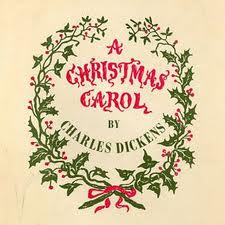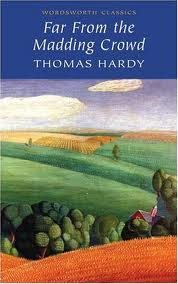
I know other people may have mentioned this previously, but A CHRISTMAS CAROL is really a fantastic novel.
First, there is the linguistic vigour, which just kills me. Here is Scrooge’s house:
They were a gloomy suite of rooms, in a lowering pile of building up a yard, where it had so little business to be, that one could scarcely help fancying it must have run there when it was a young house, playing at hide-and-seek with other houses, and forgotten its way out again.
Here is Scrooge’s assessment of his house:
Darkness is cheap, and Scrooge liked it.
Then there is the comedy. Here’s Bob Cratchit:
Wherefore the clerk put on his white comforter, and tried to warm himself at the candle; in which effort, not being a man of a strong imagination, he failed.
And here’s Scrooge’s response to the ghost of his old partner Marley, denying its existence:
You may be an undigested bit of beef, a blot of mustard, a crumb of cheese, a fragment of an underdone potato. There’s more of gravy than the grave about you, whatever you are!
But overall I think it is the warm-hearted morality that makes this book remarkable. Here is a lovely image of Bob Cratchit going home on Christmas Eve, after a miserable day at Scrooge’s offices:
The office was closed in a twinkling, and the clerk . . went down a slide on Cornhill, at the end of a lane of boys, twenty times, in honour of its being Christmas Eve, and then ran home to Camden Town as hard as he could pelt, to play at blindman’s-bluff.
Here’s the ghosts Scrooge sees through the window
Every one of them wore chains like Marley’s Ghost; some few (they might be guilty governments) were linked together; none were free.
Not mentioning any names, but I love this idea, a partner to my general hope that there is a hell so certain people now in power can burn it.
And then of course there is the wonderful change to Scrooge, that gives this novel a sense of completion and closure rare in fiction. Here he is Christmas morning:
Shaving was not an easy task, for his hand continued to shake very much; and shaving requires attention, even when you don’t dance while you are at it.
I’d heard before that Dickens ‘invented Christmas, but I never quite believed it till this book inspired me to do a bit of googling. It’s strange to think now, but apparently Christmas was beginning to be forgotten as a holiday before he put his giant Victorian energy to it. It is to him we owe the idea of a snowy Christmas (the first eight years of his life were white Christmases), to him we owe the idea of turkey, of Christmas pudding, of goodwill to all men.
Seriously, he should have organised to get a percentage on all of the above, which is now regularly sold to us. He’d be minting it.





